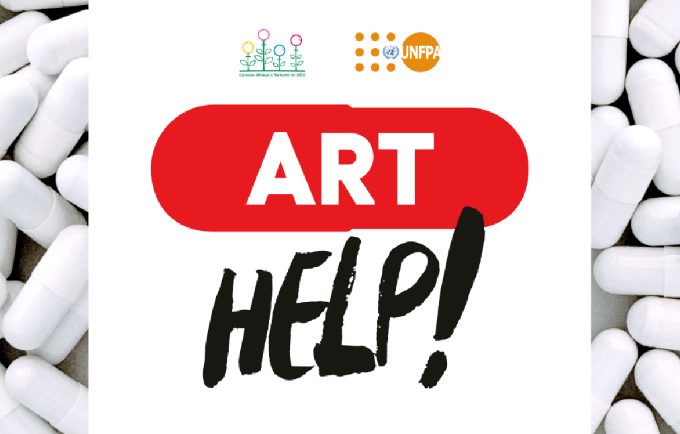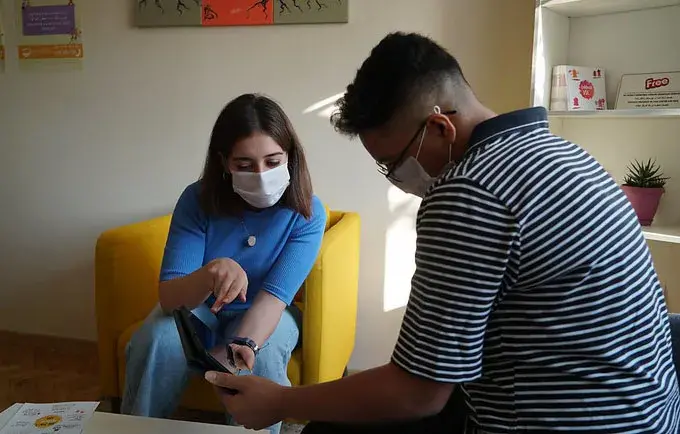The Eurasian Women’s Network on AIDS, with support from UNFPA's Regional Office for Eastern Europe and Central Asia, has launched a dedicated hotline to help people living with HIV and key populations in Eastern Europe and Central Asia who have difficulties receiving antiretroviral therapy (ART) and reproductive health and gender-based violence counselling and services due to the COVID-19 pandemic and associated quarantines, border closures, lockdowns and disruptions in supply chains and service provision.
Due to the COVID-19 pandemic and the introduction of restrictions by states, an increasing number of people living with HIV outside their home countries are asking for help with getting access to life-saving antiretroviral therapy. The inability to cross borders during lockdowns, overwhelmed healthcare systems that are poorly equipped to address the needs of migrants and foreigners, stigma, discrimination and sometimes even criminalization of people living with HIV and key populations – all contribute to the risk of interruption of ART.
“Disruptions or termination of ART medications put all those dependent on continuous treatment in danger of developing complications that increase their risk of contracting COVID-19, with life-threatening consequences,” said Andrey Poshtaruk, Regional Advisor on HIV at the UNFPA Regional Office for Eastern Europe and Central Asia.
“The new hotline, ART HELP, is another entry point for people living with HIV who need help outside their country of residence or registration in a condition of travel restrictions. We collaborate with two organizations that are already supporting people who find themselves in such conditions: ITPCru and Life4me. Our counselors themselves are living with HIV and understand the value and importance of antiretroviral treatment. They will do their utmost for a person seeking help to prevent treatment interruption. This project will help us to strengthen cross-country solidarity and partnership. We will be especially sensitive to women subjected to violence,” said Alina Yaroslavska, the project coordinator at the Eurasian Women’s Network on AIDS.
The project will operate in Armenia, Azerbaijan, Belarus, Estonia, Georgia, Kazakhstan, Kyrgyzstan, Latvia, Lithuania, Moldova, Russia, Tajikistan, Uzbekistan and Ukraine.
Apart from addressing the accessibility of ART, the project will also focus on mapping and analysis of accessibility of services for women living with HIV and women from vulnerable groups who experience gender-based violence in the region. Gender stereotypes related to HIV and self-stigmatization fuel violence that women living with HIV experience. Measures taken to stop the spread of COVID-19 such as lockdowns and isolations at homes have led to a sharp increase in the number of cases of domestic violence. The situation is further complicated by limited access to justice and social services, and those few crisis centers that do exist are often closed due to quarantines or do not accept new requests to accommodate women who have experienced violence.
Requests for help can be made through the “Send Message” button on the Facebook page of the Eurasian Women’s Network on AIDS or by filling in this form, or by writing on email to arthelp19@gmail.com.
A counselor will be assigned to each person contacting the hotline. This counselor will provide advice or referral to receive antiretroviral therapy or the necessary services.
_________________________________________________________________________
Please pass this information on to people living with HIV among your friends and family.
If you are an HIV-service organization or community of people living with HIV and you are ready to help others in receiving antiretroviral therapy, please contact us at: linayaroslavska@gmail.com
For more information, please contact: Alina Yaroslavska, linayaroslavska@gmail.com, +90 544 689 64 94 (Viber, WhatsApp)




